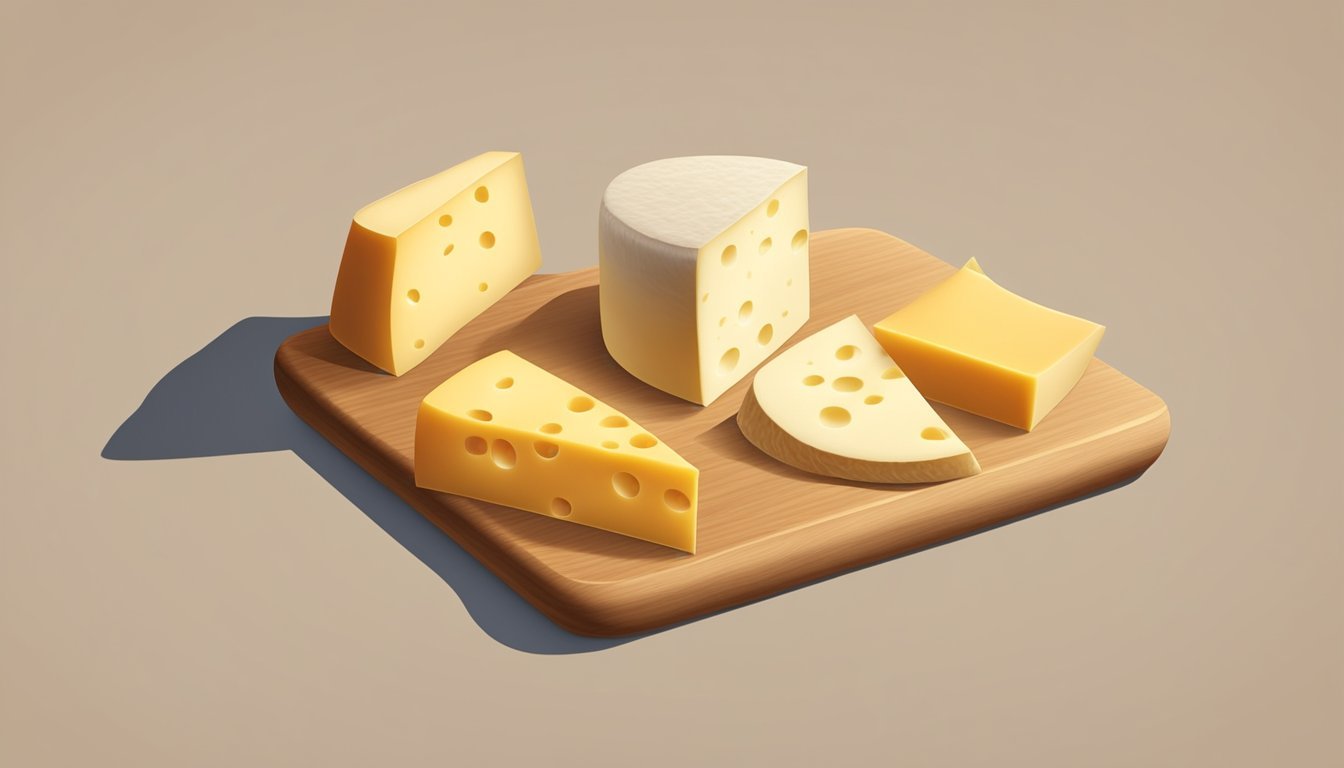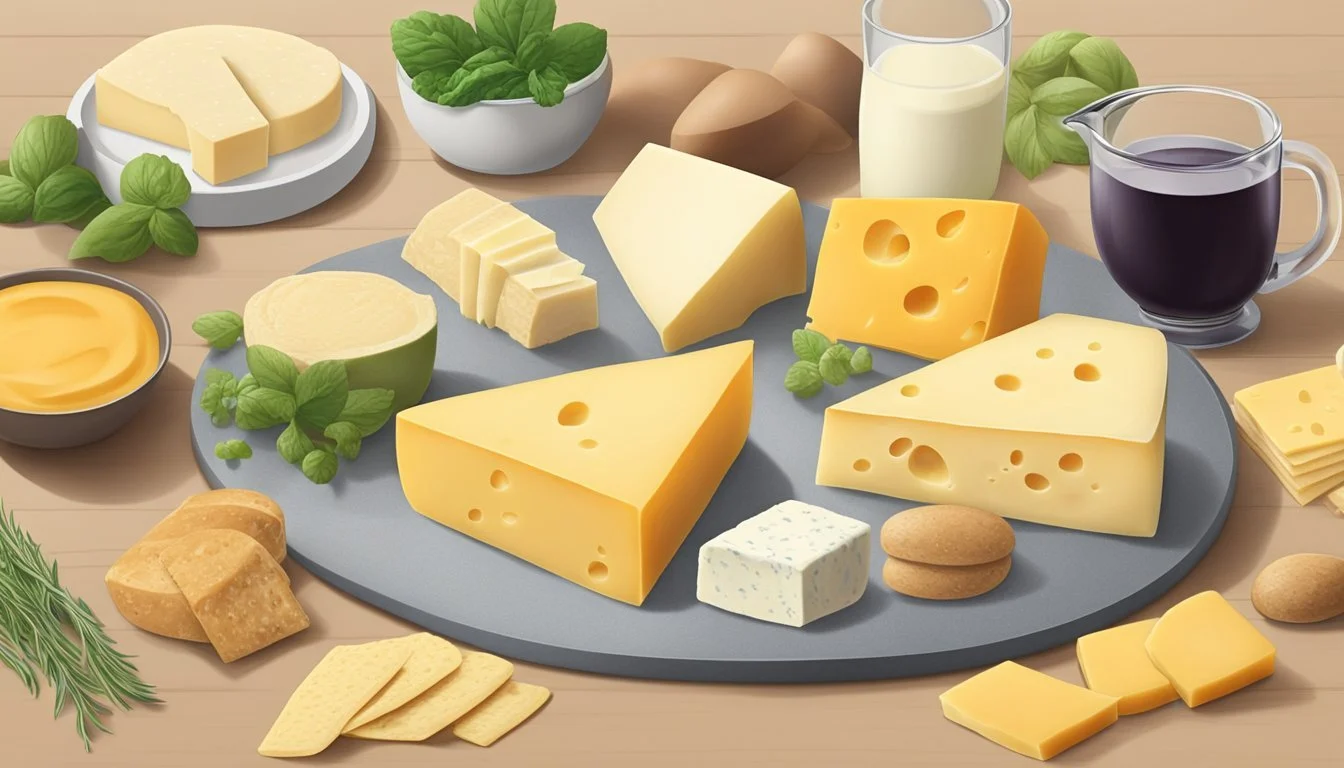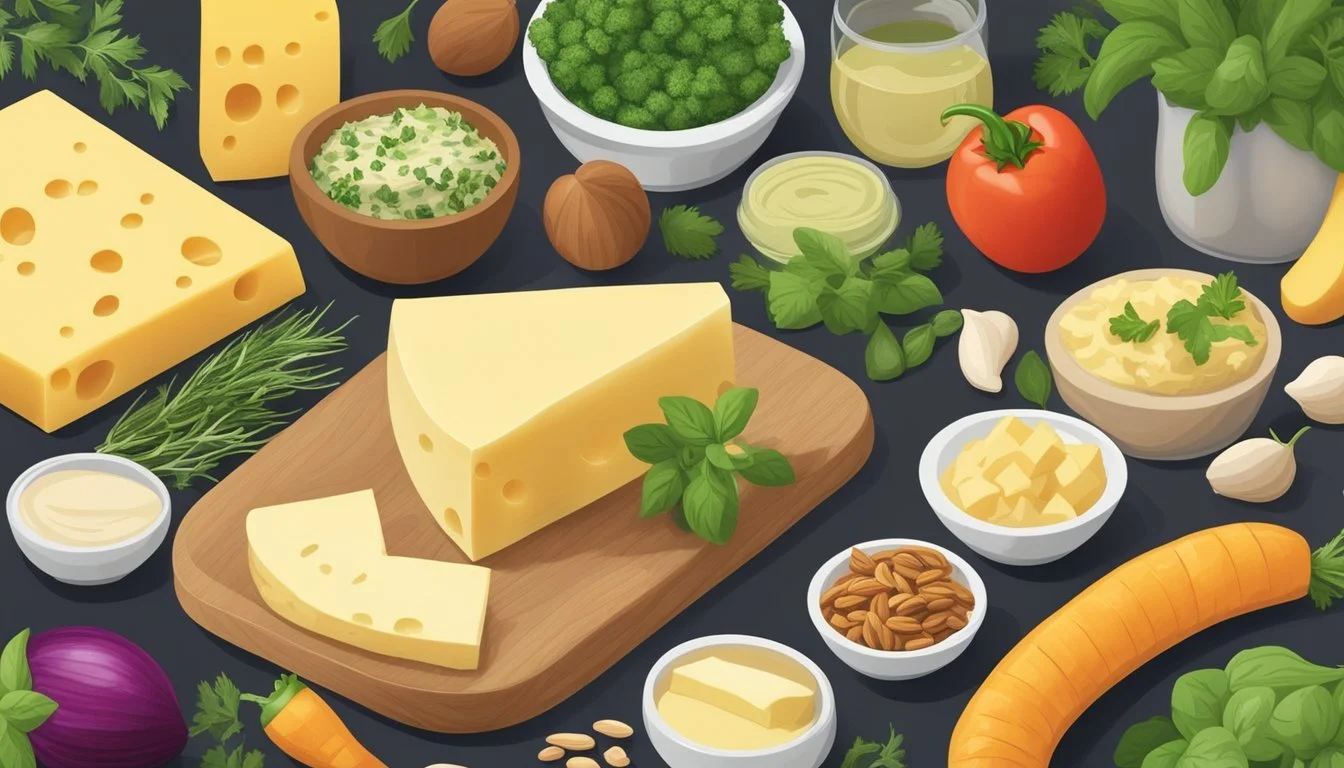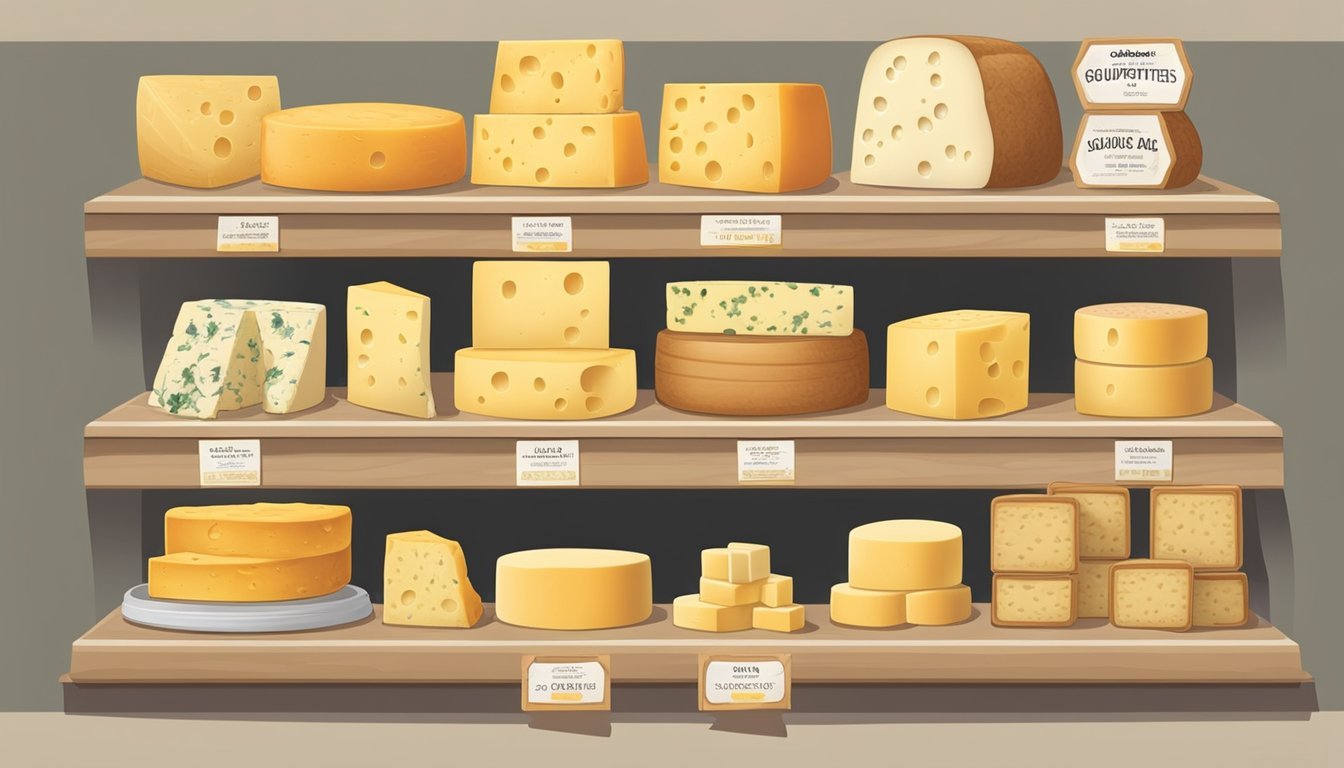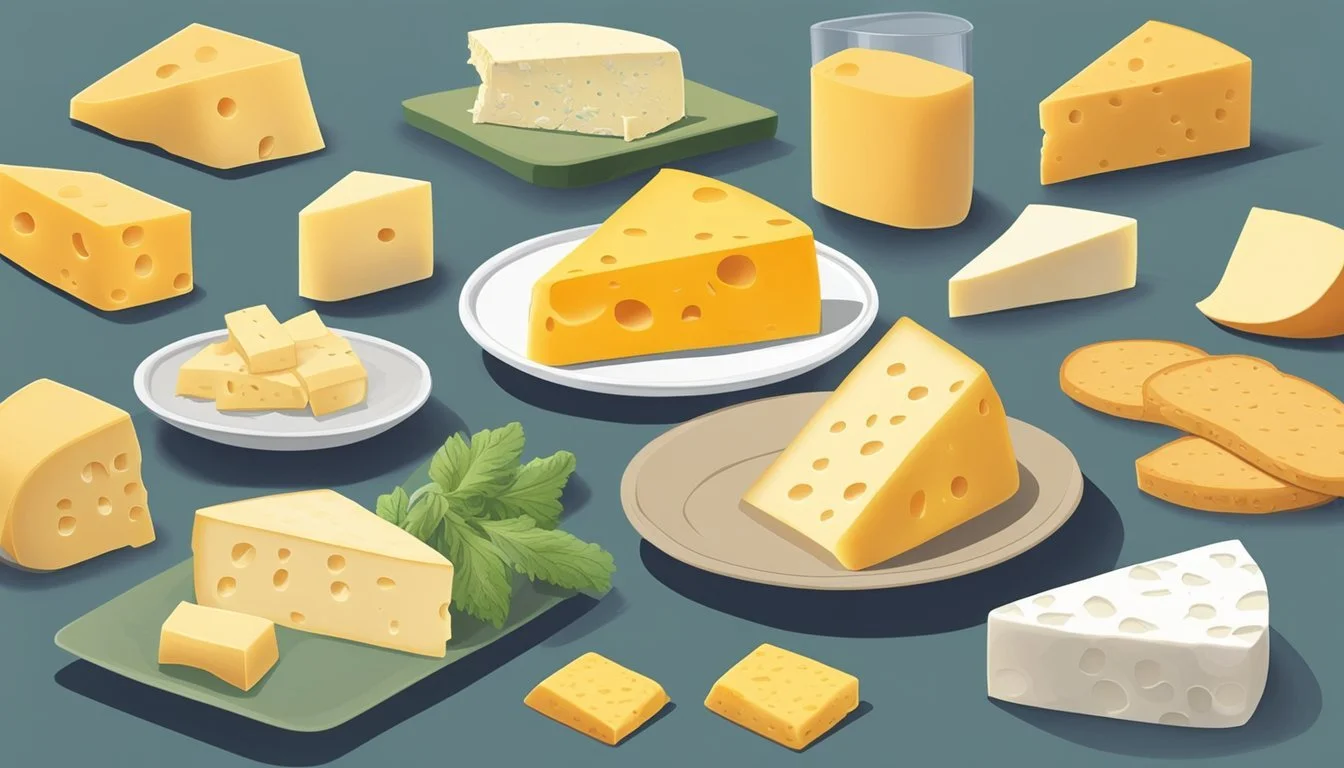Gouda Cheese Substitutes
Top Alternatives for Your Recipes
Gouda cheese (What wine goes well with cheese?), with its creamy, buttery flair and sweet undertones, is a favorite amongst cheese aficionados. Originating from the Netherlands, this semi-hard cheese has cemented its place in a variety of dishes, from simple sandwiches to elaborate cheese platters. Yet, there are instances when gouda might not be available, or a recipe may call for a substitute that complements the specific flavor profile of gouda without overpowering other ingredients.
In such cases, finding the right substitute for Gouda cheese is essential to maintaining the integrity of the dish. Suitable alternatives include cheeses that share a similar semi-hard texture and can melt gracefully when heated. Cheeses such as Havarti, with its smooth and mellow taste, or Edam, which is mildly salty, are often recommended. Similarly, Gruyere offers a slightly nutty flavor and good melting properties, making it a viable stand-in for Gouda in various recipes.
Understanding Gouda Cheese
Gouda cheese is a renowned Dutch cheese recognized for its rich flavor profile and versatility in culinary applications, offering both nutritional value and a unique texture.
Origin and Characteristics
Originating from the Netherlands in the town of Gouda, this cheese reflects a rich heritage of Dutch cheesemaking. Gouda cheese is characterized by its semi-hard texture and typically presents a yellowish hue. It usually contains a few small holes, also known as "eyes," and has a mild yet slightly sweet flavor. The texture of Gouda becomes denser and its flavor more complex as it ages.
Nutritional Profile
Gouda is not just appreciated for its taste but also for its nutritious content. A 100g serving of Gouda cheese typically contains:
Calcium: Essential for bone health
Protein: Important for muscle repair and growth
Fat content: Can vary depending on the type of Gouda, with aged versions having higher fat concentrations
Lactose: Younger varieties contain more lactose, while aged Gouda contains less, making it more tolerable for individuals with lactose sensitivity.
Culinary Uses
Gouda cheese holds a prestigious place in culinary circles. It is versatile and can be used in a myriad of dishes, including sandwiches and as a flavorful addition to crackers. Its ability to melt well makes it an excellent choice for baked dishes, fondues, and sauces. Whether used as a primary ingredient or as a garnish, Gouda adds a smooth, rich element to a variety of recipes.
Reasons for Substituting Gouda Cheese
When one considers replacing Gouda cheese in a dish, it typically relates to dietary needs, taste preferences, or the cheese's availability. These factors guide the selection of an appropriate substitute to match Gouda's unique characteristics.
Dietary Restrictions
For individuals with lactose intolerance, Gouda cheese may cause discomfort due to its lactose content. A vegan substitute is essential for those following a plant-based diet, as traditional Gouda is made from cow's milk. Lower cholesterol options may also be sought by those mindful of their heart health.
Lactose Intolerance: Seek lactose-free cheeses or plant-based alternatives.
Vegan Needs: Choose from various non-dairy cheeses made from nuts or soy.
Cholesterol Concerns: Opt for low-fat or fat-free cheese alternatives.
Texture and Flavor Preferences
Gouda's mild, creamy taste and semi-hard texture aren't preferred by everyone. Some might look for a bolder or more complex flavor, while others may desire a softer or firmer texture.
Preference for Different Flavor Profiles: Explore cheeses with nuttier or more piquant notes.
Texture Variations: Look for softer like Brie or harder cheeses like Parmesan to suit textural desires.
Availability Concerns
Gouda cheese may not be readily available in all regions, leading to the need for a substitute. Local markets may have a more limited selection, or the cost might be prohibitive, affecting availability.
Local Marketplace Limits: Certain cheeses might not be stocked in smaller stores.
Cost-Effectiveness: More affordable cheeses can provide a similar taste and texture at a lower cost.
Finding substitutes for Gouda is influenced by a variety of practical and personal considerations, ensuring that every dish meets specific dietary, taste, and availability requirements.
Cheese Alternatives Comparable to Gouda
When looking for a Gouda cheese substitute, one can consider cheeses that match Gouda's characteristics in terms of texture, melting properties, and flavor profile. Here's a detailed guide to suitable cheese alternatives.
Semi-Hard Cheese Substitutes
For a semi-hard cheese similar to Gouda, Edam and Havarti stand out as excellent alternatives. Edam offers a mildly nutty and slightly salty flavor, and is known for its smooth texture, making it well-suited for sandwiches and cheese platters. On the other hand, Havarti provides a buttery and creamy taste with an equally great capacity to melt, which works well in cooked dishes.
Edam: Mild and salty, smooth texture.
Havarti: Buttery and creamy, melts well.
Hard Cheese Substitutes
For those seeking a harder cheese that can substitute Gouda, one might consider Muenster or Gruyere. Muenster cheese, with its smooth and mildly tangy flavor, can replace Gouda in many recipes. Gruyere, a bit firmer than Gouda, provides a savory and nutty flavor which is less sweet but still complements dishes that require a cheese with character.
Muenster: Mildly tangy, smoothly melts.
Gruyere: Savory and nutty, firm texture.
Creamy Cheese Substitutes
If the creaminess of Gouda is desired, a young Cheddar can be an alternative. While aged Cheddar might be too strong and crumbly, a young Cheddar offers a milder taste and satisfies the need for a cheese with creamy melting properties.
Cheddar: Mild (when young), creamy melt.
Vegan and Dairy-Free Alternatives
For individuals seeking to replace Gouda cheese with vegan and dairy-free options, there is a multitude of alternatives available. These options cater to different dietary needs and preferences, ensuring that there is a substitute for everyone.
Plant-Based Cheese Varieties
Vegan cheeses are crafted from a variety of plant sources, each offering a distinct flavor and texture profile. Almonds and cashews are prominent bases, yielding substitutes such as Almond Cheese and Cashew Cheese.
Almond Cheese: Almond-based cheeses often impart a slightly grainy texture and a nutty taste, making them a favorable option for those looking for a cheese with body and richness.
Cashew Cheese: Cashew-based substitutes, known for their creamy texture, are a preferred choice for many due to their versatility and smooth mouthfeel.
The nutritional profile of these vegan cheeses typically includes vitamin E from almonds and healthy fats from cashews, contributing to an overall nutritious addition to any diet.
Homemade Dairy-Free Substitutes
For consumers interested in tailoring their dairy-free cheese experience, homemade vegan cheese substitutes offer a customizable alternative.
Ingredients to create a basic vegan cheese sauce might include:
2 tablespoons cornstarch
2 teaspoons agar-agar
Blended cashews and aquafaba
The method generally involves blending the main ingredients until smooth, cooking the mixture on the stove until thickened, and setting it in a mold.
By selecting different base ingredients and seasonings, one can emulate the desired Gouda flavor profile or create a unique and personal vegan cheese blend.
Specialty Gouda Substitutes
When seeking a substitute for Gouda cheese, specialty options can provide a similar rich and complex flavor profile. These alternatives cater to distinct preferences, whether one desires the smoky essence of Smoked Gouda or the tangy kick found in spiced and flavored cheeses.
Smoked Alternatives
For those who appreciate the smoky notes in Smoked Gouda, a suitable substitute could be a smoked cheddar. This cheese delivers a comparable depth of flavor with its robust smokiness, ensuring a seamless transition in recipes that require smoked cheese. The texture is often firm enough to hold up well in cooking, a characteristic valued in cheeses similar to Gouda.
Recommended Smoked Alternatives:
Smoked cheddar
Smoked provolone
Smoked gouda itself as a substitute for regular gouda
Spiced and Flavored Alternatives
If one's palate leans towards cheeses with additional seasonings, Pepper Jack Cheese can be an adventurous alternative. Its buttery flavor resembles Gouda, while the added peppers offer a spicy complexity.
Characteristics of Spiced and Flavored Alternatives:
Buttery flavor: Maintains the creaminess one associates with Gouda.
Spices: Introduces an element of heat or zest to dishes.
Texture: Varies across different types of spiced cheeses, yet many remain close to the semi-hard consistency of Gouda.
Such substitutes not only replace the cheese but also add an extra dimension to the culinary experience.
Applications and Pairings
When substituting Gouda cheese in various dishes, it’s important to consider how well the alternative melts, complements cold dishes, and enhances appetizers (What wine goes well with appetizers?) and snacks.
Melting and Cooking
For dishes requiring cheese that melts well like macaroni and cheese or grilled cheese sandwiches, one should select a substitute that offers a smooth texture upon melting. Havarti is noteworthy for its creamy meltability, making it suitable for a comforting bowl of macaroni and cheese. Similarly, Gruyere retains a creamy consistency with a distinctly nutty flavor, ideal for a savory twist on the classic grilled cheese sandwich.
Macaroni and Cheese: Havarti, Gruyere
Grilled Cheese Sandwiches: Gruyere, Fontina
Salads and Cold Dishes
Choices for salads and cold dishes benefit from a milder cheese that won’t overwhelm the dish’s freshness. Edam, with its slightly salty yet mild taste, and young Fontina, known for a gentle creamy note, are excellent in salad applications. They don't overpower the other ingredients but rather contribute to a balanced flavor profile.
Salads: Edam, young Fontina
Appetizers and Snacks
For appetizers and snacks, one needs cheeses that can be enjoyed with wine and crackers or can offer a burst of flavor to small bites. Mild cheddar can be elegantly paired with fruits for a simple yet satisfying appetizer. Furthermore, Havarti’s affinity for fruit pairing extends to bites like cheese and grape skewers or apple slices topped with a slice of cheese.
Pairing with Wine and Crackers: Mild cheddar, Havarti
Cheese and Fruit Combinations: Havarti (with grapes or apples)
Shopping and Storage Tips
When shopping for Gouda cheese substitutes, it's crucial to find options that offer similar creaminess and flavor profiles while considering their availability. Proper storage is key to preserving the cheese's intended flavor and texture.
Finding Quality Substitutes
When seeking Gouda cheese alternatives, shoppers should focus on semi-hard cheeses that possess a slight nuttiness and melt well. Preferred substitutes include:
Havarti: Creamy with a mild taste.
Gruyere: Slightly sweet with a nutty flavor.
Edam: Less creamy, with a milder flavor and often more affordable.
Emmental: Known for its meltability and subtle sweetness.
Mild Cheddar: A common option that is budget-friendly and widely available.
One should select these cheeses based on their availability in local markets or specialty stores. For meltability akin to Gouda, a cheese's creaminess is an important aspect to consider, while the cheese flavor should align with personal preference, ranging from mild to nutty.
Preserving Flavor and Texture
To maintain the quality of Gouda substitutes, appropriate storage is essential:
Refrigeration: Keep the cheese wrapped in parchment or wax paper, then in a loose plastic bag.
Humidity and Temperature: Store at a consistent temperature and moderate humidity to prevent drying out or becoming too moist.
Airtight Containers: For longer storage, airtight containers can prevent unwanted odors and flavor contamination.
By adhering to these storage tips, consumers can ensure that the flavor and texture of their Gouda cheese substitutes remain as intended for enjoyable consumption.
Health Considerations
When considering substitutes for Gouda cheese, it's important to understand how the allergen content, fat, and nutrients can impact health.
Allergens and Intolerances
Lactose: All cheeses, including Gouda and its substitutes, contain varying levels of lactose, which can be a concern for individuals with lactose intolerance. Aged cheeses typically have lower lactose content, making them more tolerable.
Cholesterol: Cheese is a source of cholesterol, and substitutes may have different cholesterol levels. Individuals watching their cholesterol intake should compare labels.
Fat Content and Nutrients
Fat: Cheeses vary in their fat content, which can affect calorie count and heart health. Substitutes like Edam may offer a lower fat option.
Calcium: An essential mineral for bone health, calcium levels can differ among cheese substitutes. Gouda is known for its high calcium content.
Protein: Cheese is a good source of protein, but the amount can vary among substitutes. Protein is crucial for muscle repair and overall health.



